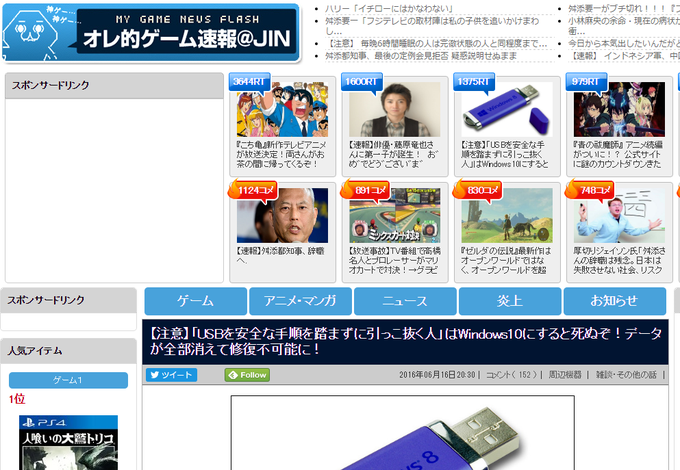sudosan 📆 June 16, 2016 📝 10
This article is so popular now that I would like to explain.
Summary for busy people 1. Don't format USB memory with NTFS 2. Don't worry if you do "safe removal" 3. It doesn't matter if you use USB memory normally (FAT32 or exFAT) .
4. Since Windows 7 is an OS with no mainstream support, such compatibility problems may increase in the future. You should upgrade if there are no special circumstances.
4. Since Windows 7 is an OS with no mainstream support, such compatibility problems may increase in the future. You should upgrade if there are no special circumstances.
As a premise, delayed write is disabled in USB memory. Assume that you unplug it without removing it safely.
First of all, USB memory is usually formatted with FAT32 or exFAT, but it seems that I thought that I used to format it with NTFS.
NTFS is a format used for internal HDDs, etc. There is almost no merit in formatting a USB memory with this. There are many disadvantages.
PS: Microsoft also avoids formatting removable disks with NTFS
It is written here why formatting removable media such as USB memory with NTFS is not recommendedAbout the removable media NTFS format https://t.co/SzTmCH541Z— People with poor servers (@ EF65_1128) June 17, 2016
Avoid formatting removable media with the NTFS file system, which performs lazy writing for performance.
It seems that delayed writing is effective by default in NTFS?
When you insert this NTFS formatted disk into Windows 10, it will be used in the latest LFS 2.0 format.
And when they do a safe removal, they are bothersomely converting to the old LFS 1.1 .
(Details around here )
There is no problem with this usage, but if you forcibly remove it and insert it into Windows 7, a problem will occur.
Windows7 does not support LFS2.0 and recognizes this as a damaged disk. So, if you do a check disk, the data seems to disappear.
Since Windows 7 has already lost mainstream support , it is unlikely that it will support LFS 2.0 in the future, and compatibility will be cut off in other parts in the future.
Keeping your OS running out of mainstream support can also introduce these risks.
If anything, 7 which is not compatible with LFS2.0 is worse . (10 is a mirror of the OS that will respond if you remove it safely for the old OS)
Usually, USB memory is used with FAT32 or exFAT, and if delayed writing is disabled, it is okay to suddenly pull out, so it is almost irrelevant for people who normally use USB memory .
Of course, the same phenomenon will occur with an external HDD, but I think that there is probably no one who suddenly pulls out the external HDD (it would be okay if you pull it out).
Finally, be sure to always "safely remove"
PS: It is not sure because it has not been verified, but if you accidentally accidentally disconnect the NTFS disk while using it with Win10, etc., disconnect it, connect it to Win10 without connecting to Win7 If you do "safe removal", I think that it will be a disk that can be read on Win7 without losing data.
PS 2: NTFS and LFS were confused, so they were corrected.
PS 3: In the first place, the NAND memory used for USB memory etc. has a limited life and someday data will blow off so make sure to back it up regularly
PS 4
PS 5
There was an article that did not create an incompatible OS . Good luck talking about using a floppy disk with PC98 for a lifetime, right? I want to be so good


0 件のコメント:
コメントを投稿